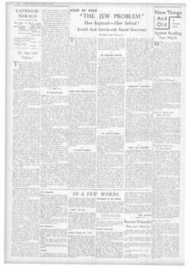Page 1, 19th August 1938
Page 1

Report an error
Noticed an error on this page?If you've noticed an error in this article please click here to report it.
Tags
Share
Related articles
English Catholic Writer And The Pope
The Case Of Alfred His Publisher
Catholic Herald
"voltaire": What The C.h.
Mr. Noyes And " Voltaire "
THE TRUTH ABOUT ALFRED NOYES
WHAT THE TIMES LEFT OUT
Interview With Lord Charnwood
It is now possible to throw new light on the tnuch-discussed decision of the Holy Office that Alfred Noyes's book Voltaire was " worthy of condemna tion." ALFRED NOYES It is hoped in all responsible quarters that the affair will cease to provide ammunition for anti-Catholic attacks on the part of those hostile to the Church.
The CATHOLIC HERALD is able to state that an important fact was omitted from the account of documents bearing on the case published by The Times on August This was that Mr. Noyes had petitioned the Holy Office to point out to him the corrections and qualifications which they desired in his book on Voltaire.
Lord Charnwood's Letter
for him to do so. Lord Charnwood wrote: ". . . Meanwhile the author has never been told what are the errors in his
book which require its suppression and some equivalent to a reparation ' from him. He has been anxious to obtain this information from the Holy Office, and stands ready to correct what is shown to be erroneous. Further than this no honest man could go. But he is advised that he can only obtain this information, if at all, by a letter which announces his previous withdrawal of all editions of the work under his control. and by implication his acknowledgment of error.
" The long and short of this is that very effective steps have already been taken towards the suppression of the book, and that a public condemnation (painful and humiliating to one of his faith) hangs over the head of its author unless he recants his errors without knowing what his errors are."
Publisher's Letter But in fact Mr Noyes has already taken the natural step of petitioning the Holy Office to point out the erroneous passages in his book, and this petition has been seconded by the publishers of Voltaire, Messrs. Sheed and Ward, who also wrote asking that they should be told what corrections and qualifications are required.
Mr. Sheed put the situation succinctly in his letter to The Times which appeared on August 13. Mr. Sheed wrote as follows: " As our firm was mentioned by Lord Charnwood in his letter on Voltaire. I should like to make our position quite clear. In accordance with the instructions of the Holy Office, privately conveyed to us by Cardinal Hinsley, we ceased to sell the book. Jointly with Mr. Noyes, 1 petitioned the Holy Office that he should be told what corrections were required. I was awaiting the result of our petition and was horrified that the matter should have been ventilated in your columns while it was still sub judire in Rome."
" Absurdly Inapplicable" Lord Charnwood, approached on the matter by the CATHOLIC HERALD, said that he could not understand how Mr. Sheed could say that the matter was still sub judice in Rome, " Such a phrase is absurdly inapplicable, and can only be described as an erroneous use. of language," he told the CATHOLIC HERALD.
Lord Charnwood, asked concerning the wisdom of making the whole affair public in the columns of The Times, replied that as to the wisdom • or otherwise of this course, he must leave that entirely to Mr. Noyes himself.
Lord Charnwood also referred to certain accusations or insinuations that in writing as he did, he was guilty of a breach of confidence.
Denial that there has been any Breach of Confidence Be desired the CA11-101.1C HERALD to state that he denied vigorously and categorically that there had been any breach of confidence in his publishing his letter to The Times.
( Editorial Comment, page 8.)
blog comments powered by Disqus

















